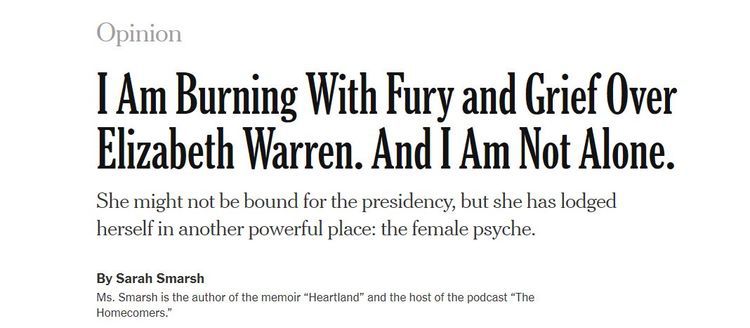
Mad Women In The NEW YORK TIMES
By Steve Sailer
03/07/2020
From the NYT opinion page:
I Am Burning With Fury and Grief Over Elizabeth Warren. And I Am Not Alone.
She might not be bound for the presidency, but she has lodged herself in another powerful place: the female psyche.By Sarah Smarsh
Ms. Smarsh is the author of the memoir “Heartland” and the host of the podcast “The Homecomers.”March 6, 2020, 8:53 p.m. ET
Consider every moment, since the dawn of woman, when a female aspired but to no avail. She asked to attend school but was denied. She raised her hand but wasn’t called on. She applied but wasn’t hired. She enlisted but wasn’t deployed. She created but wasn’t credited. She ran but wasn’t elected.
Imagine the sadness and frustration of every such instance as a spark, their combined energy the size of many suns. That is the measure of grief and fury I felt rise inside me as I watched Elizabeth Warren’s bid for the Democratic nomination wane.
From the NYT “smarter living” page:
How to Respond to Microaggressions
Should you let that comment slide, or address it head on? Is it more harm than it’s worth? We can help.By Hahna Yoon
March 3, 2020For many of us, microaggressions are so commonplace that it seems impossible to tackle them one at a time. Psychologists often compare them to death by a thousand cuts. …
I felt my thousandth cut a few Novembers ago standing outside a bar as my friend’s boyfriend explained to me the concept of American Thanksgiving. From the time in fourth grade when my teacher made me read the part of “slanted-eyed child” in a play to every time a stranger in the online dating world told me he “loves Asian women,” I have been pressed with the dilemma of how I should react to these seemingly small lacerations. Should I respond? Is it worth it?
When I tell people that I am writing about microaggressions, most — even some of my closest friends who are women of color — ask me why. It’s tempting to ignore microaggressions, considering blatant, obvious discrimination is still a real problem, but the buildup of these “everyday slights” has consequences on a victim’s mental and physical health that cannot be overlooked.
… Diane Goodman, a social justice and diversity consultant, says the process is unfair, but having to decide whether or not to take action is inevitable in today’s society. “The emotional labor should not have to fall on people from marginalized groups.”
Why aren’t angry women being paid for their emotional labor?
